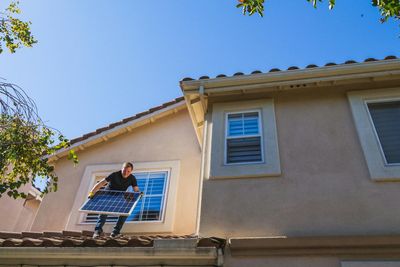guest column
Expert shares tips on ways to make solar panels more accessible to Houstonians
There’s no question that some homeowners feel a twinge of envy when they see solar panels appearing on homes in their neighborhood. The twin benefits of cutting utility costs and participating in renewable energy are alluring to many.
But as those homeowners consider going solar, many never take the plunge because of concerns about affordability, maintenance and uncertainties around qualifying for tax credits and other state and local rebates. For all its appeal, going solar can seem a bit daunting.
But there are more plentiful financing options available to many Texas homeowners that offer accommodating paths for acquiring solar. They also provide solutions to concerns around maintenance and affordability.
Two innovative strategies for switching to solar
Solar energy providers have been working diligently to deliver more convenient pathways for consumers to make the switch. Recently, two new strategies were introduced in Texas: direct, loan-based ownership, and third-party ownership.
Direct system ownership
With this option, homeowners take out a loan to cover the cost of their solar system and its installation. They can then repay that loan over timeframes ranging from five to twenty-five years.
There are varying rates and terms available to accommodate the preferences and goals of individual homeowners. And while manufacturer warranties and installer workmanship warranties have been available to homeowners, it is important to look for companies that offer guarantees for an extended period of time given that most systems can last several decades. For example, Freedom Forever offers a 25-year production guarantee that provides consumers with a measure of comfort around the long-term costs of owning these systems.
Third-party ownership
Another solar financing option involves third-party ownership using a Power Purchase Agreement (PPA) or lease. With a PPA option, a third-party owns the system, and homeowners either agree to buy power at a pre-defined rate per kWh or through a set monthly payment. Homeowners also have the option of leasing the panels for comparable pre-defined rates or monthly payments. (Maybe add one more sentence that explains the difference between PPAs vs lease).
With these two options, the third party insures and maintains the system. This alleviates some of the maintenance and up front cost concerns that have held some back from solar.
Issues to consider before making the switch
Even with the availability of these new options, solar power doesn’t always make sense for everyone. Your personal energy goals and preferences, as well as your tax situation, are important factors to consider when making this decision. Here are some questions folks should ask before making the switch:
- Would I prefer owning the system outright or relying on a third-party to handle insurance and maintenance?
- Am I looking for monthly savings now through a PPA or lease or would I prefer the quickest payback and return on investment?
- Do I have a tax liability that enables me to get a Federal Tax Credit?
The answers to these questions will help you determine which option, if any, makes sense for you. It’s important to remember there is no “best solution for everyone” when considering your options; there’s only the question of what’s right for you.
Other important considerations
Keep in mind that not everyone will qualify for one of the solar options described above. Even in these cases, your state, local utility or a regional credit union may offer alternative financing options that can help you access solar.
Home equity lines of credit may also be a fitting option for some. Dsireusa.org is an excellent resource to help you investigate what incentives and programs are available in your area.
Final tips
As with any important financial decision, it’s a homeowner’s’ responsibility to practice due diligence in terms of assessing what they can afford and who they buy from. Here are some recommended best practices:
- Always get several quotes from various companies.
- Ask about production guarantees and warranties.
- Ask about the need of a service panel upgrade at the start.
- Verify that the company you choose offers products that will work with your home construction and roof.
- Prioritize solar providers with an extensive list of authorized dealers, such as Freedom Forever.
- Confirm that your prospective solar partner has purchasing options around loans and financing and can help you identify the option that best suits your needs.
The good news is that more homeowners than ever before can now feel more comfortable moving to solar. The new options described above for financing and maintenance can make that switch considerably less daunting than it seemed only a few years ago.
———
Robert Angell is the vice president of sales operations at Freedom Forever, one the nation’s largest solar installers.
